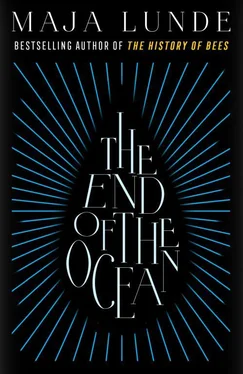Maja Lunde
THE END OF THE OCEAN
To Jesper, Jens, and Linus

LINK
Ringfjorden, Sogn og Fjordane, Norway, 2017
Nothing stopped the water. You could follow it from the mountain to the fjord, from the snow that fell from the clouds and settled on the peaks, to the mist that rose above the ocean and again became clouds.
The glacier grew every single winter; it accumulated snow, every winter it grew as it should and every summer it melted, releasing drops, drops that became streams, flowing downwards, driven by gravity, and the streams joined other streams, becoming waterfalls, rivers.
We were two villages that shared a mountain and a glacier and we’d had them for as long as we could remember. One side of the mountain was a vertical wall, where the Sister Falls descended; they crashed straight down for 711 meters towards Lake Eide, a deep green body of water after which the village Eidesdalen was named and which provided fertile growing conditions there for animals and human beings.
Eidesdalen, Magnus’s village.
They couldn’t see the fjord in Eidesdalen; they weren’t accustomed to having the taste of salt on their lips, the salt was not carried by the wind and they could not smell the ocean, but they had their water, the water without taste, the water that made everything grow, and later Magnus said that he had never missed the ocean.
On the other side of the mountain it was milder, less harsh. Here the water accumulated in the River Breio, the salmon river, the water ouzel’s river, the freshwater mussels’ river. It forced its way through a crevasse in the landscape, forming this chasm with millions of drops every single second, in waterfalls, in streams and in calm, smooth stretches. When the sun shone, it became a luminous ribbon.
The River Breio continued all the way to Ringfjorden, and there, in the village at sea level, the river met with salt water. There the water from the glacier became one with the ocean.
Ringfjorden, my village.
And then they were together, the water from the glacier and the water from the ocean, until the sun absorbed the drops once more, drew them up into the air as mist, to the clouds where they escaped the force of gravity.
*
I’m back now. Blåfonna, the glacier that once was ours, has forced me to return. There is no wind when I reach Ringfjorden, I am obliged to use the engine to travel the final stretch, and the clattering sound drowns out everything else. Blue glides through the water and leaves only small ripples in its wake.
I can never forget this landscape. It has created you, Signe, Magnus once said. He meant it had imprinted itself in me, the way I walk with my legs slightly bent, as if I am always confronting a hill. Nonetheless I am surprised now when I see it again: the summits, the falls, the vertical meeting with the horizontal.
People travel here from far away to see this landscape and find the sight to be “beautiful, fantastic, amazing.” They stand on ship decks as large as football fields while enormous diesel engines spew out exhaust fumes, stand there and point and gaze at the clear blue water, the bluish-green hillsides where fragile houses cling tightly to forty-five-degree-angle slopes, and more than one thousand meters above them are the mountains, the earth’s stripped, sharp edges, breaking against the sky, with a sprinkling of white that the tourists love, “wow, it’s snow,” whether it’s winter or summer.
But the tourists don’t see the Sister Falls or Sønstebø’s summer farms on the mountain, they have long since disappeared; they can’t see the River Breio, which was the very first to go, before the ships arrived, long before the Americans and Japanese came with their telephones and cameras and telephoto lenses. The pipes are hidden underground and the damage inflicted on the wildlife by the excavation work has slowly been concealed by vegetation.
I stand there with the tiller in my hand, moving slowly as I approach the village. I pass the power plant, a huge concrete building all by itself down by the water; it is heavy and dark—a monument to the dead river and waterfall, from there the cables stretch out in all directions, some of them cross over the fjord. They have even received permission for that.
The engine drowns out everything, but I remember the sound of the power lines, the soft humming in wet weather, water against electricity, a crackling. It has always given me goose bumps, especially in darkness, when you can see how it sparks.
*
All four of the moorings for visitors at the wharf are vacant; it’s too early for tourists and the moorings are used only in the summertime, so I can take my pick. I choose the spot furthest out, mooring the craft astern and at the bow, and put out a spring line to be on the safe side; the wind from the west could blow up without any warning. As I pull the throttle control completely astern, I can hear the reluctant gasps of the engine shutting down. I close the hatch to the saloon and place the bunch of keys in the breast pocket of my parka. Attached to the key ring is a big cork ball that ensures it will float and makes a small bulge over my stomach.
The bus stop is where it has always been, outside the consumer co-op. I sit and wait; the bus comes only once an hour. That’s how it is here: nothing much happens and everything must be planned. I have just forgotten this after all these years.
Finally it appears. I am accompanied by a group of adolescents. They come from the high school that was built in the early 1980s—the new one, the nice one, one of the many things the village could afford. As they talk and talk about tests and homework assignments, I can’t help but notice their smooth foreheads, soft cheeks; they are astoundingly young, without any marks whatsoever, without the traces of a life lived.
They don’t even bother to glance at me. I understand them well. For them I am just an aging woman, a little shabby and unkempt in a worn-out parka, with gray locks of hair sticking out from beneath a knitted hat.
They have new, almost identical hats, with the same logo in the middle of the brow. I hasten to take off my own and put it in my lap. It is full of fuzz balls. I start picking them off one by one and my hand fills up with lint. But there’s no point, there are too many of them to remove and now I don’t know what to do with them, so I end up sitting there holding a soft mound in my hand. Finally, I drop it onto the floor. The wool floats weightlessly down the aisle, but the adolescents don’t pay it any mind, and why should they look at a clump of gray lint?
Sometimes I forget how I look. After a while you stop caring about your appearance when you live on board a boat, but once in a great while when I see myself in a mirror on land, when the lighting is good, I am startled. Who is she, the person in there, who in the world is that skinny old biddy?
It is strange—no, surreal, surreal is the word—that I’m one of them, the old people, when I am still so completely myself through and through, the same person I have always been; whether I am fifteen, thirty-five or fifty, I am a constant, unchanged mass, like the person I am in a dream, like a stone, like one-thousand-year-old ice. My age is disconnected from me, only when I move does its presence become perceptible—then it makes itself known through all its pains, the aching knees, the stiff neck, the grumbling hip.
Читать дальше












